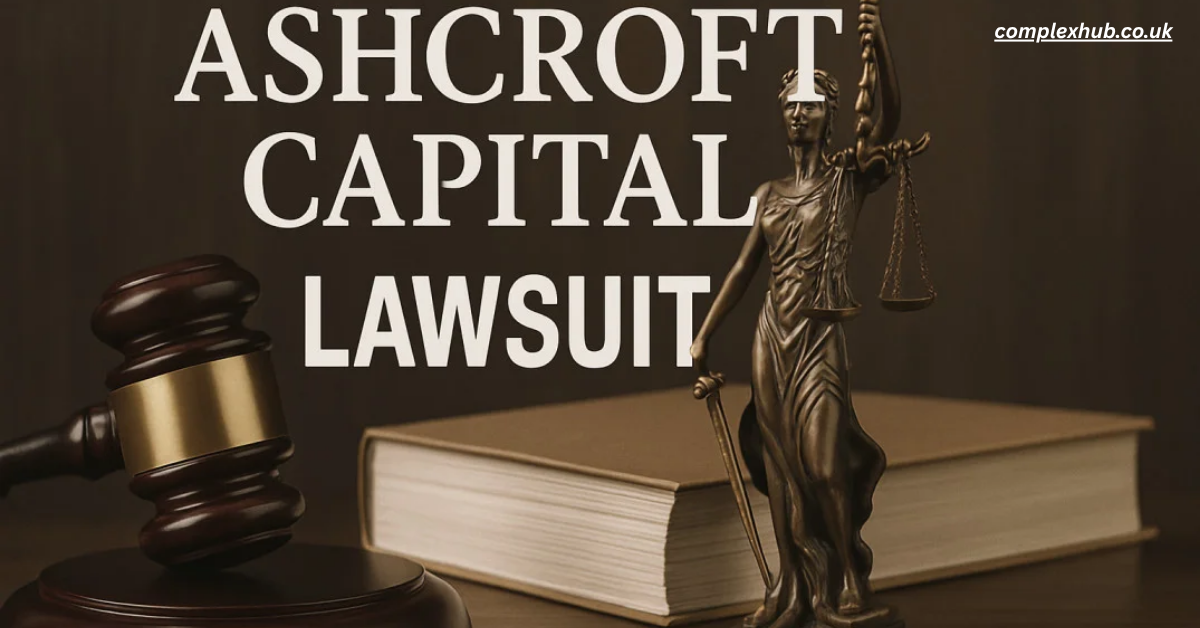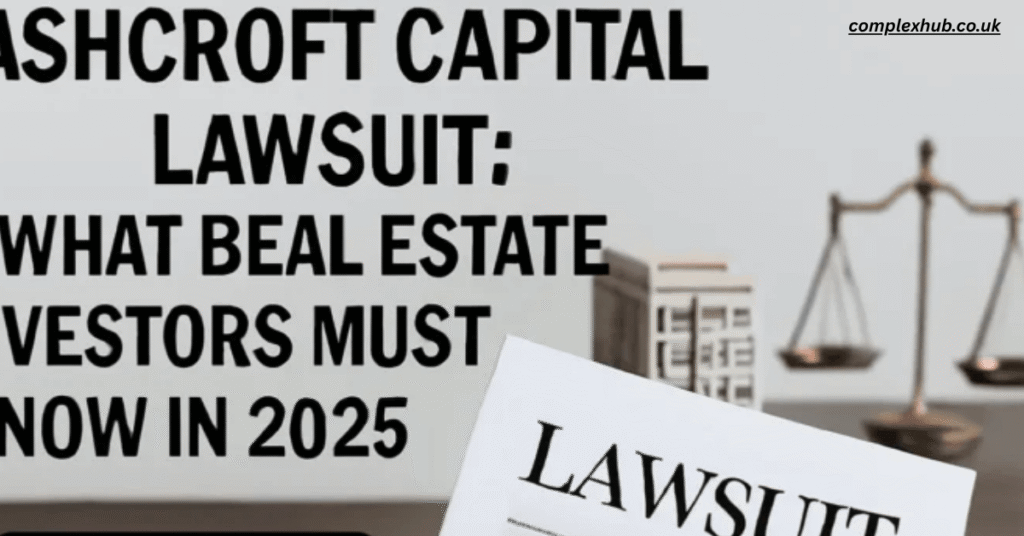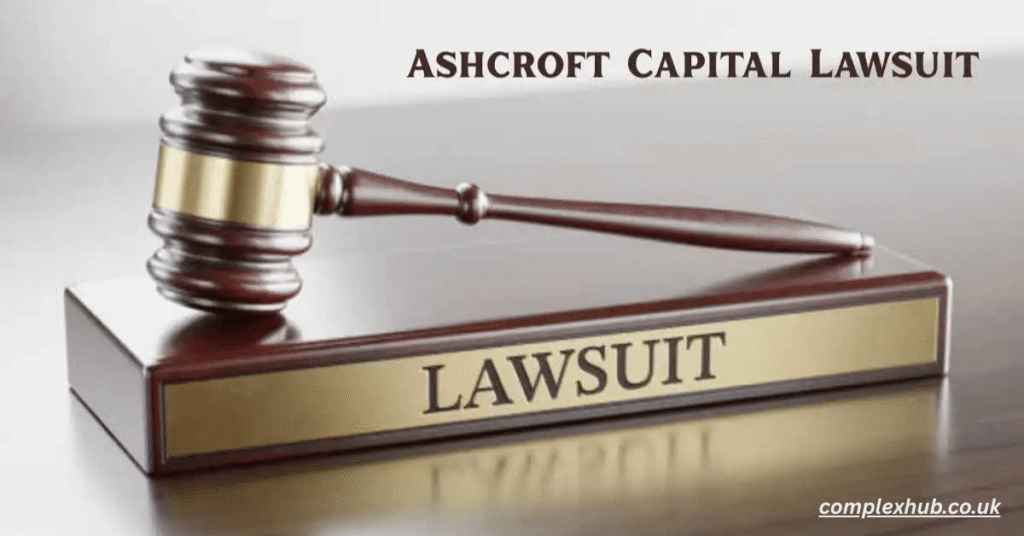
The world of passive investing has always promised attractive rewards—especially in booming sectors like multifamily properties. One name that has consistently emerged in this space is Ashcroft Capital LLC, co-founded by Joe Fairless and Frank Roessler. But even industry giants face scrutiny. The ongoing Ashcroft Capital lawsuit has ignited conversation across investor forums like Reddit (r/CommercialRealEstate and r/ottawa), raising questions about investment risks, transparency, and accountability in real estate syndications.
This article delivers a fact-based, expert-informed perspective on the Ashcroft case, built around clarity, trust, and insight. Whether you’re a seasoned syndication investor or a newcomer exploring real estate deals, here’s what you need to know to protect and empower your investment strategy.
What Is Ashcroft Capital?
Ashcroft Capital LLC is a U.S.-based real estate investment firm specializing in multifamily properties. Founded by Joe Fairless and Frank Roessler, the firm became a household name among passive investors due to its aggressive growth, strong brand presence, and consistent performance promises. By pooling funds from investors, Ashcroft acquires large apartment communities, aiming for cash flow, Internal Rate of Return (IRR), and capital appreciation.
The company’s offerings have been marketed through podcasts, blogs, and webinars. Many appreciated Ashcroft’s attention to investment offering documents, due diligence, and clear communication—until now. With assets in the hundreds of millions and a reputation for delivering strong investment returns, the company was seen as a beacon of trust. The current lawsuit, however, casts a new light on how investor expectations and sponsor realities can diverge.
What Sparked the Ashcroft Capital Lawsuit?
The Ashcroft Capital lawsuit was triggered by a group of investors who filed a class-action lawsuit, alleging breaches of duty and misleading projections. The core claims include unrealistic investment projections, vague financial disclosures, and inadequate communication regarding property valuations and performance metrics.
Investors argue they were led to believe their money was managed with high transparency and accountability. Allegations point to breaches in fiduciary duty, financial mismanagement, and underreported risks. Ashcroft’s alleged failure to provide accurate audit reports, clarity on capital calls, or updates on exit fees has drawn sharp criticism—both legally and publicly.
Ashcroft’s Response on Ashcroft Capital Lawsuit
In response, Ashcroft Capital has categorically denied any wrongdoing. They argue that all investment materials clearly disclosed that returns were projections, not guarantees. Furthermore, they attribute underperformance to market conditions—including rising interest rates and inflation—rather than internal mismanagement.
Ashcroft has reaffirmed its stance that all investors were informed of associated investment risks. They also contend that their actions complied with all regulatory standards, including those set by the Securities and Exchange Commission (SEC). Their legal defense, managed by the well-regarded firm Graves Garrett, has been transparent, confident, and cooperative as the legal process unfolds.

Where Does the Case Stand Now?
Currently, the Ashcroft Capital lawsuit is in the discovery phase within the U.S. District Court for the Western District of Missouri. This stage involves collecting emails, documents, and transaction histories to build a case for both sides. As is common in such cases, this process could take months, if not longer.
No trial date has been set, and there’s still potential for an out-of-court settlement. Meanwhile, third-party platforms such as the Better Business Bureau (BBB) have seen a spike in inquiries and reviews related to Ashcroft. Some regulatory bodies and investor protection groups are also beginning to monitor similar syndication models more closely.
What This Means for Investors
The case has shone a spotlight on essential investor responsibilities. For those engaged in passive investing, this moment serves as a reminder to dive deep into due diligence, thoroughly read investment offering documents, and ask sponsors tough questions.
Moreover, investors should begin prioritizing risk management, seek clarity on acquisition fees, asset management fees, and understand the timing and conditions surrounding exit fees. Trust in a sponsor’s brand or podcast presence is no substitute for independent verification and financial literacy.

The Bigger Picture
The Ashcroft lawsuit isn’t just about one firm—it’s a wake-up call for the real estate syndication industry at large. With more than $10 billion in real estate syndications completed in 2023, it’s clear that greater transparency is needed across the board.
Regulatory conversations are already in motion. The Securities Industry and Financial Markets Association (SIFMA) and state officials like Missouri Secretary of State Jay Ashcroft are exploring stricter rules for syndication disclosures. These efforts may soon enforce standardized audit reports, clearer explanations of capital calls, and better projections to protect investor interests.
What Makes Ashcroft Capital Lawsuit Case Unique?
What makes this case so compelling is Ashcroft’s stature. Unlike many small, lesser-known syndicators, Ashcroft Capital is a leading firm with strong branding, educational outreach, and a wide investor base. The lawsuit challenges the notion that only unknown or poorly-rated firms fall into legal trouble.
Additionally, the community response has been widespread and passionate. Forums like Reddit’s r/CommercialRealEstate and r/ottawa have hosted dozens of discussions with both skeptical and supportive voices. It’s a rare moment where legal, financial, and grassroots investor communities converge.
Investor Protections Moving Forward
Now more than ever, investors should demand third-party audits, thorough reviews of investment offering documents, and professional oversight on larger investments. Knowing the Internal Rate of Return (IRR) and how it’s calculated isn’t just good practice—it’s essential protection.
Investors should also examine how the legal entity is structured. Are you buying equity, or just offering a loan to the sponsor? Are the acquisition fees, exit fees, and asset management fees reasonable compared to market standards? These questions must be clarified before money changes hands.
Stay Informed, Stay Empowered
Real estate investing is evolving, and being informed is your best defense. Tools like SEC filings, sponsor track records, and financial advisors are valuable resources. With AI-based dashboards and legal tech tools, verifying property valuations and historical investment returns is easier than ever.
Empowerment also means staying engaged. Don’t “set and forget” your investments. Request quarterly updates, review balance sheets, and follow investor communities to stay in tune with emerging trends and red flags.
Key Takeaways After Ashcroft Capital Lawsuit
- Ashcroft Capital LLC, despite its popularity, faces serious allegations around transparency and investor communication.
- Joe Fairless and Frank Roessler deny all claims and attribute poor performance to uncontrollable market conditions.
- The case is ongoing in the U.S. District Court for the Western District of Missouri, with implications for broader industry regulations.
- Investors are urged to conduct proper due diligence, understand investment risks, and focus on financial disclosures and audit reports.
- This lawsuit is a valuable learning opportunity and a catalyst for raising industry standards.

How to Protect Your Portfolio
To protect your real estate investments:
- Get Professional Advice: Involve a financial advisor or attorney for large deals.
- Ask for Independent Audits: Never rely solely on internal sponsor reports.
- Verify IRR and Projections: Understand how performance is modeled.
- Scrutinize Fees: Be clear on all types of sponsor compensation.
- Stay Involved: Ask for regular updates and participate in investor calls.
Quick Facts
- Firm: Ashcroft Capital LLC
- Co-founders: Joe Fairless & Frank Roessler
- Lawsuit Type: Class-Action, Alleging Breach of Fiduciary Duty
- Court: U.S. District Court for the Western District of Missouri
- Legal Representation: Graves Garrett
- Entities Watching: SEC, BBB, SIFMA, Missouri Secretary of StateFinal Thoughts
The Ashcroft Capital lawsuit is more than a legal event—it’s a pivotal moment for syndication investors everywhere. Whether the outcome leads to reforms or reaffirms current practices, one thing is clear: informed, proactive investors are the best defense against financial uncertainty. Use this moment not to panic, but to power up your portfolio with better tools, sharper questions, and stronger strategies.
FAQs
Q: Is Ashcroft Capital still operating?
Yes, the firm is actively managing assets and issuing public statements while defending the lawsuit.
Q: Is this the first lawsuit against a real estate syndicator?
No, but it’s among the most high-profile due to Ashcroft’s prominence in the industry.
Q: Will investors lose their money?
That’s unclear. Outcomes depend on legal rulings and potential settlements.
Q: What should I look for in investment offering documents?
Transparency on projected returns, fees, risk disclosures, and legal structure.
Q: Are other firms under scrutiny?
Yes, this case has sparked broader regulatory interest in passive real estate investments.
READ MORE: Traceloans.com Business Loans





